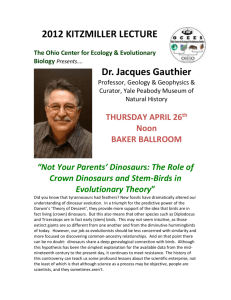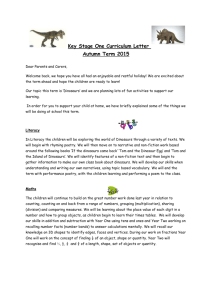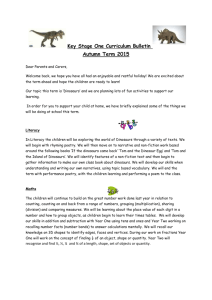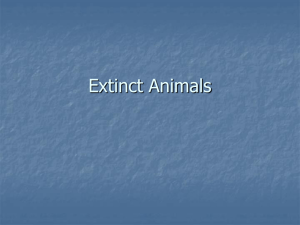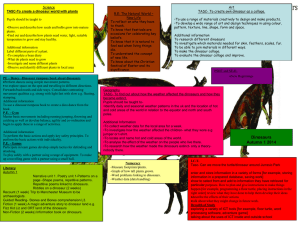Year 3 AutumnTerm 2013
advertisement
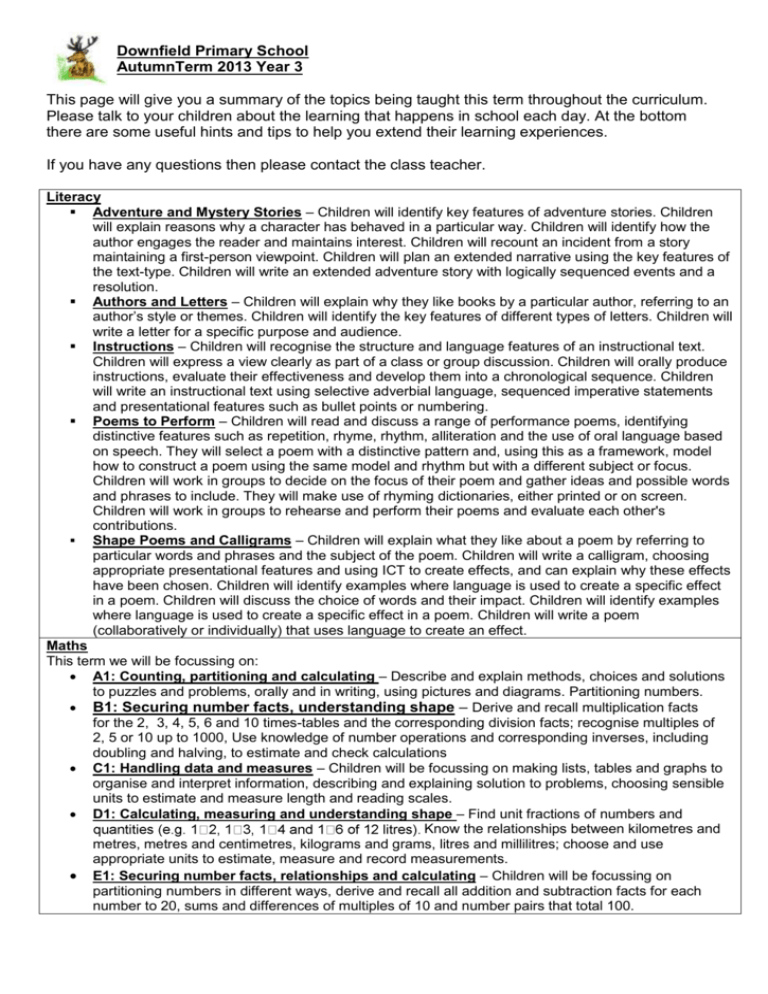
Downfield Primary School AutumnTerm 2013 Year 3 This page will give you a summary of the topics being taught this term throughout the curriculum. Please talk to your children about the learning that happens in school each day. At the bottom there are some useful hints and tips to help you extend their learning experiences. If you have any questions then please contact the class teacher. Literacy Adventure and Mystery Stories – Children will identify key features of adventure stories. Children will explain reasons why a character has behaved in a particular way. Children will identify how the author engages the reader and maintains interest. Children will recount an incident from a story maintaining a first-person viewpoint. Children will plan an extended narrative using the key features of the text-type. Children will write an extended adventure story with logically sequenced events and a resolution. Authors and Letters – Children will explain why they like books by a particular author, referring to an author’s style or themes. Children will identify the key features of different types of letters. Children will write a letter for a specific purpose and audience. Instructions – Children will recognise the structure and language features of an instructional text. Children will express a view clearly as part of a class or group discussion. Children will orally produce instructions, evaluate their effectiveness and develop them into a chronological sequence. Children will write an instructional text using selective adverbial language, sequenced imperative statements and presentational features such as bullet points or numbering. Poems to Perform – Children will read and discuss a range of performance poems, identifying distinctive features such as repetition, rhyme, rhythm, alliteration and the use of oral language based on speech. They will select a poem with a distinctive pattern and, using this as a framework, model how to construct a poem using the same model and rhythm but with a different subject or focus. Children will work in groups to decide on the focus of their poem and gather ideas and possible words and phrases to include. They will make use of rhyming dictionaries, either printed or on screen. Children will work in groups to rehearse and perform their poems and evaluate each other's contributions. Shape Poems and Calligrams – Children will explain what they like about a poem by referring to particular words and phrases and the subject of the poem. Children will write a calligram, choosing appropriate presentational features and using ICT to create effects, and can explain why these effects have been chosen. Children will identify examples where language is used to create a specific effect in a poem. Children will discuss the choice of words and their impact. Children will identify examples where language is used to create a specific effect in a poem. Children will write a poem (collaboratively or individually) that uses language to create an effect. Maths This term we will be focussing on: A1: Counting, partitioning and calculating – Describe and explain methods, choices and solutions to puzzles and problems, orally and in writing, using pictures and diagrams. Partitioning numbers. B1: Securing number facts, understanding shape – Derive and recall multiplication facts for the 2, 3, 4, 5, 6 and 10 times-tables and the corresponding division facts; recognise multiples of 2, 5 or 10 up to 1000, Use knowledge of number operations and corresponding inverses, including doubling and halving, to estimate and check calculations C1: Handling data and measures – Children will be focussing on making lists, tables and graphs to organise and interpret information, describing and explaining solution to problems, choosing sensible units to estimate and measure length and reading scales. D1: Calculating, measuring and understanding shape – Find unit fractions of numbers and Know the relationships between kilometres and metres, metres and centimetres, kilograms and grams, litres and millilitres; choose and use appropriate units to estimate, measure and record measurements. E1: Securing number facts, relationships and calculating – Children will be focussing on partitioning numbers in different ways, derive and recall all addition and subtraction facts for each number to 20, sums and differences of multiples of 10 and number pairs that total 100. IPC Topic – Treasure In History, we’ll be finding out: How artefacts can help us find out about the past How we can use fact and opinion to create a profile about a historical person About different historical sources About famous archaeologists In Geography, we’ll be finding out: How we can learn about the past from the buildings and people in our local area About local archaeologists and the work they do to uncover the past About how we can discover buried artefacts and treasures hidden in our school grounds In Art, we’ll be finding out: What makes a piece of art a ‘treasure’ How we can use guesswork to make models of different treasures In Technology, we’ll be finding out: How to plan and make our own historical artefacts In International, we’ll be finding out: About how different cultures preserve and treasure different things About the work of archaeologists around the world Footprints from the past In History, we’ll be finding out: About the different time periods when dinosaurs lived How to make a time line About fossil hunters from around the world About different ideas to explain why the dinosaurs died out In Geography, we’ll be finding out: What the Earth looked like millions of years ago Where to look for dinosaur bones In Science, we’ll be finding out: How to make a dinosaur footprint How to find out what dinosaurs looked like What dinosaurs ate How to sort and classify dinosaurs About the other animals and plants that lived at the same time as the dinosaurs In Art, we’ll be finding out: About how artists draw dinosaurs How to make a sculpture of a dinosaur How to make reptile-skin patterns In International, we’ll be finding out: Where dinosaurs have been found About the rules of exploration ICT – Authoring We will be able to: Correct errors in our work using ICT Edit, save and retrieve work independently Use secondary sources to research and create pieces of work RE – Sikhism We will be: Learning about places of worship and symbols Discussing where we belong in society and how we know Sikh’s belong to their religion Exploring the importance of light in Sikhism Learning about what Sikh’s beliefs are PE – Swimming and Gymnastics We will be:Swimming Learning to be confident in the water and extend on the swimming ability we have. We will be:Gymnastics Stretching, Curling & Arching Symmetry & Asymmetry Travelling Ways which you can help at home; Literacy: Please remind pupils to use capital letters, full stops, commas, question marks and paragraphs in their writing at home, including their homework. Please make sure children are reading to an adult at least three times a week. Maths: Please help your child to practise their timetables up to 10, number bonds to 20 & Split 3 digit numbers into place value. IPC: You could support your child by: Researching dinosaurs and exploring different artefacts to learn about the past Exploring the history of treasure and making links to their literacy work Discussing how things have changed. What was Earth like when the dinosaurs were alive? How have toys, clothes and society changed?
